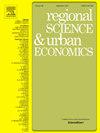联邦税收政策和地方公共产品的资本化
IF 2.9
2区 经济学
Q1 ECONOMICS
引用次数: 0
摘要
本研究考察了联邦税收政策与地方公共产品资本化到房价之间的联系,重点是州和地方税(SALT)的扣除。在美国,纳税人可以从他们的联邦应税收入中扣除支付给地方管辖区的税款,有效地减少了地方公共产品的净成本。我们开发了一个地方公共产品资本化的理论模型,该模型预测,在扣除地方税的居民比例更高的司法管辖区,公共产品的资本化会更高。我们通过在转移-份额工具变量框架中利用地方对2017年减税和就业法案(TCJA)的国家财政变化的敞口来检验这一预测。利用学区支出,我们发现了实证支持,即更高比例的居民扣除财产税导致更大的地方公共支出资本化。特别是,在没有居民扣除财产税的学区,学校支出每增加一个标准差,对应的房价就会下降1.2%,而在25%的居民享受财产税减免的学区,对应的房价就会上涨2.8%。因此,我们的研究结果强调了在评估地方公共产品提供的最佳水平时,地方和国家政策之间相互作用的重要性,并为评估SALT扣除的未来提供了指导。本文章由计算机程序翻译,如有差异,请以英文原文为准。
Federal tax policy and the capitalization of local public goods
This study examines the connection between federal tax policies and the capitalization of local public goods into housing prices, focusing on the deduction of State and Local Taxes (SALT). In the United States, taxpayers can deduct taxes paid to local jurisdictions from their federal taxable incomes, effectively reducing the net cost of local public goods. We develop a theoretical model of local public goods capitalization that predicts a higher capitalization of public goods in jurisdictions with a greater share of residents who deduct local taxes. We test this prediction by exploiting local exposure to national fiscal changes from the 2017 Tax Cuts and Jobs Act (TCJA) in a shift-share instrumental variable framework. Using school district spending, we find empirical support that a higher share of residents deducting property taxes causes a greater capitalization of local public spending. In particular, a one-standard-deviation increase in school spending corresponds to a 1.2% decrease in house value in school districts where no resident deducts property taxes but to a 2.8% rise in values in districts where 25% of the residents take advantage of the property tax deduction. Our results thus emphasize the importance of the interaction between local and national policies when evaluating the optimal level of local public good provision, and provide guidance for evaluating the future of the SALT deductions.
求助全文
通过发布文献求助,成功后即可免费获取论文全文。
去求助
来源期刊

Regional Science and Urban Economics
Multiple-
CiteScore
5.30
自引率
9.70%
发文量
63
期刊介绍:
Regional Science and Urban Economics facilitates and encourages high-quality scholarship on important issues in regional and urban economics. It publishes significant contributions that are theoretical or empirical, positive or normative. It solicits original papers with a spatial dimension that can be of interest to economists. Empirical papers studying causal mechanisms are expected to propose a convincing identification strategy.
 求助内容:
求助内容: 应助结果提醒方式:
应助结果提醒方式:


